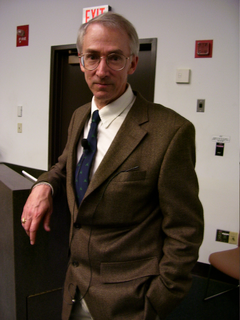A Quote by Charles Darwin
From the first dawn of life, all organic beings are found to resemble each other in descending degrees, so that they can be classed in groups under groups. This classification is evidently not arbitrary like the grouping of stars in constellations.
Related Quotes
The ends of scientific classification are best answered, when the objects are formed into groups respecting which a greater number of general propositions can be made, and those propositions more important, than could be made respecting any other groups into which the same things could be distributed. ... A classification thus formed is properly scientific or philosophical, and is commonly called a Natural, in contradistinction to a Technical or Artificial, classification or arrangement.
If you look back at history or you look at any place in the world where religious groups or ethnic groups or racial groups or political groups are killing each other, or families have been feuding for years and years, you can see - because you're not particularly invested in that particular argument - that there will never be peace until somebody softens what is rigid in their heart.
Paris is a city of centralisation--and centralisation and classification are closely allied. In the early times, when centralisation is becoming a fact, its forerunner is classification. All things which are similar or analogous become grouped together, and from the grouping of groups rises one whole or central point. We see radiating many long arms with innumerable tentaculae, and in the centre rises a gigantic head with a comprehensive brain and keen eyes to look on every side and ears sensitive to hear--and a voracious mouth to swallow.
Extinction has only separated groups: it has by no means made them; for if every form which has ever lived on this earth were suddenly to reappear, though it would be quite impossible to give definitions by which each group could be distinguished from other groups, as all would blend together by steps as fine as those between the finest existing varieties, nevertheless a natural classification, or at least a natural arrangement, would be possible.
Wisdom in groups emerges as a product of commitments we make with ourselves and to each other. These stances are not abstract rules but tangible practices that must be renewed each time we are in groups. They are essentially commitments and attitudes that foster collaboration and positive collective action.
For most of modern life, our strong talents and desires for group effort have been filtered through relatively rigid institutional structures because of the complexity of managing groups. We haven't had all the groups we've wanted, we've simply had the groups we could afford. The old limits of what unmanaged and unpaid groups can do are no longer in operation.
I am in total opposition to any institutional power. I favor a world of neighborhoods in which all social organization is voluntary and the ways of life are established in small, consenting groups. These groups could cooperate with other groups as they saw fit. But all cooperation would be on a voluntary basis. As the French anarchist Proudhon said. “Liberty [is] not the daughter but the Mother of Order.




































